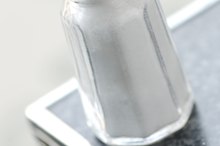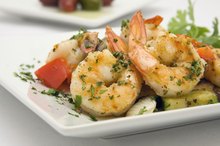Symptoms of Excessive Iodine Intake
Your body needs iodine in trace amounts for growth, development and to make thyroid hormones. Most people in the United States get sufficient iodine because iodine is added to table salt. You’re probably more likely to consume too much iodine, so never take an iodine supplement without speaking to your doctor first. Too much iodine can interfere with your thyroid and leave you with a host of unwanted symptoms.
Stomach and Mouth Problems
Excessive iodine can wreak havoc on your stomach. You may experience abdominal pain, diarrhea or vomiting. Aside from a burning feeling in your mouth and throat, you might also be left with an unpleasant metallic taste in your mouth because the iodine is interfering with taste sensations you’re sending to your brain.
Hypothyroidism
Gout and Iodine
Learn More
When you get excessive iodine, the iodine interferes with the manufacture of thyroid hormones resulting in low thyroid hormone levels, or hypothyroidism. Symptoms of hypothyroidism include fatigue, weight gain, dry skin and intolerance to changes in temperature. Too much iodine also puts you at risk for other thyroid diseases including Hashimoto’s disease, Graves’ disease and thyroid cancer, according to the University of Maryland Medical Center.
Other Symptoms
If you can never seem to quench your thirst, but have little to no urine output, you may be experiencing two symptoms of iodine toxicity, reports Medline Plus. Too much iodine can also leave you feeling delirious and put you in a stupor. Other symptoms include coughing, fever, shortness of breath, shock and seizures.
Recommended Dietary Allowance
Iodine & Selenium Dosage for Thyroid Problems
Learn More
The recommended dietary allowance of iodine for adults is 150 micrograms. Pregnant women need 220 micrograms and breastfeeding women need 290 micrograms to support the growth and development of the fetus and baby. The Tolerable Upper Intake for adults, including pregnant and breastfeeding women, is 1,100 micrograms. According to the Linus Pauling Institute, most diets from natural foods give you less than 1,000 micrograms of this nutrient per day making it rare for excessive iodine intake without taking a supplement. Iodine is found in table salt, cod, shrimp, cow’s milk, baked potatoes and turkey breast.
- The recommended dietary allowance of iodine for adults is 150 micrograms.
- The Tolerable Upper Intake for adults, including pregnant and breastfeeding women, is 1,100 micrograms.
Related Articles
References
- American Thyroid Association. Iodine Deficiency. 2020.
- Eastman CJ, Zimmermann MB. The iodine deficiency disorders. In: Feingold KR, Anawalt B, Boyce A, et al., editors. Endotext. South Dartmouth, MA: MDText.com, Inc. Updated February 6, 2018.
- Ahad F, Ganie SA. Iodine, Iodine metabolism and Iodine deficiency disorders revisited. Indian J Endocrinol Metab. 2010;14(1):13-17.
- Kostoglou-athanassiou I, Ntalles K. Hypothyroidism - new aspects of an old disease. Hippokratia. 2010;14(2):82-87.
- American Thyroid Association. Hypothyroidism in Children and Adolescents. 2020.
- National Institutes of Health, Office of Dietary Supplements. Iodine. Updated July 9, 2019.
- U.S. National Library of Medicine. Congenital hypothyroidism. Updated February 11, 2020.
- Johnson LE. Iodine. Merck Manual Professional Version. Updated October 2018.
- Murthy MB, Krishnamurthy B. Severe irritant contact dermatitis induced by povidone iodine solution. Indian J Pharmacol. 2009;41(4):199-200. doi:10.4103/0253-7613.56069
- Puchalski AR, Chopra IJ. Radioiodine treatment of differentiated thyroid cancer despite history of 'iodine allergy'. Endocrinol Diabetes Metab Case Rep. 2014;2014:130084. doi:10.1530/EDM-13-0084
- Schabelman E, Witting M. The relationship of radiocontrast, iodine, and seafood allergies: a medical myth exposed. J Emerg Med. 2010;39(5):701-707. doi:10.1016/j.jemermed.2009.10.014
- National Institutes of Health, Office of Dietary Supplements. Iodine. Updated July 9, 2019.
- American Cancer Society. Radioactive Iodine (Radioiodine) Therapy for Thyroid Cancer. Updated March 14, 2019.
- Centers for Disease Control and Prevention. Potassium iodide (KI). Updated April 4, 2018.
- Kalra S, Unnikrishnan AG, Sahay R. The hypoglycemic side of hypothyroidism. Indian J Endocrinol Metab. 2014;18(1):1-3.doi:+10.4103/2230-8210.126517
Writer Bio
Michelle Fisk began writing professionally in 2011. She has been published in the "Physician and Sports Medicine Journal." Her expertise lies in the fields of exercise physiology and nutrition. Fisk holds a Master of Science in kinesiology from Marywood University.









